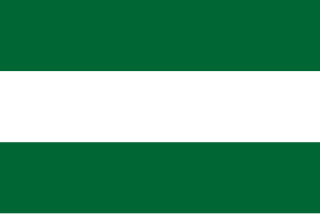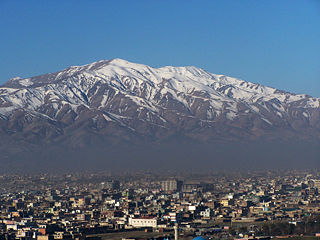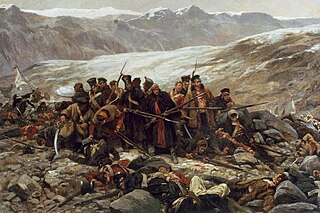
Afghanistan, officially the Islamic Emirate of Afghanistan, is a landlocked country located at the crossroads of Central Asia and South Asia. Referred to as the Heart of Asia, it is bordered by Pakistan to the east and south, Iran to the west, Turkmenistan to the northwest, Uzbekistan to the north, Tajikistan to the northeast, and China to the northeast and east. Occupying 652,864 square kilometres (252,072 sq mi) of land, the country is predominantly mountainous with plains in the north and the southwest, which are separated by the Hindu Kush mountain range. Kabul is the country's largest city and serves as its capital. As of 2021, Afghanistan's population is 40.2 million, composed of ethnic Pashtuns, Tajiks, Hazaras, Uzbeks, Turkmens, Qizilbash, Aimak, Pashayi, Baloch, Pamiris, Nuristanis, and others.

The Durrani Empire or the Afghan Empire, also known as the Sadozai Kingdom, was an Afghan empire that was founded by Ahmad Shah Durrani in 1747, that spanned parts of Central Asia, the Iranian plateau, and the Indian Subcontinent. At its peak, it ruled over the present-day Afghanistan, much of Pakistan, parts of northeastern and southeastern Iran, eastern Turkmenistan, and northwestern India. Next to the Ottoman Empire, the Durrani Empire is considered to be among the most significant Islamic Empires of the 18th century.

Babur, born Zahīr ud-Dīn Muhammad, was the founder of the Mughal Empire in the Indian subcontinent. He was a descendant of Timur and Genghis Khan through his father and mother respectively. He was also given the posthumous name of Firdaws Makani.

Kabul is the capital and largest city of Afghanistan. Located in the Eastern half of the country, it is also a municipality, forming part of the Kabul Province; it is administratively divided into 22 municipal districts. According to 2023 estimates, the population of Kabul was 5 million people. In contemporary times, the city has served as Afghanistan's political, cultural, and economical center, and rapid urbanisation has made Kabul the 75th-largest city in the world and the country's primate city.

Hamid Karzai is an Afghan statesman who served as the fourth president of Afghanistan from July 2002 to September 2014, including as the first elected president of the Islamic Republic of Afghanistan from December 2004 to September 2014. He previously served as Chairman of the Afghan Interim Administration from December 2001 to July 2002. He is the chief (khān) of the Popalzai Durrani tribe of Pashtuns in Kandahar Province.

The First Anglo-Afghan War was fought between the British Empire and the Emirate of Kabul from 1838 to 1842. The British initially successfully invaded the country taking sides in a succession dispute between emir Dost Mohammad (Barakzai) and former emir Shah Shujah (Durrani), whom they reinstalled upon occupying Kabul in August 1839. The main British Indian force occupied Kabul and endured harsh winters. The force and its camp followers were almost completely massacred during the 1842 retreat from Kabul.

The Second Anglo-Afghan War was a military conflict fought between the British Raj and the Emirate of Afghanistan from 1878 to 1880, when the latter was ruled by Sher Ali Khan of the Barakzai dynasty, the son of former Emir Dost Mohammad Khan. The war was part of the Great Game between the British and Russian empires.
Indian television dramas are dramatic television programs written, produced, and filmed in India, with characters played by Indian actors and episodes broadcast on Indian television.

The Battle of Kabul was part of a punitive campaign undertaken by the British against the Afghans following the disastrous retreat from Kabul. Two British and East India Company armies advanced on the Afghan capital from Kandahar and Jalalabad to avenge the complete annihilation of the British-Indian military-civilian column in January 1842. Having recovered prisoners captured during the retreat, the British demolished parts of Kabul before withdrawing to India. The action was the concluding engagement to the First Anglo-Afghan War.

Hinduism in Afghanistan is practiced by a tiny minority of Afghans, believed to be about 30-40 individuals as of 2021, who live mostly in the cities of Kabul and Jalalabad. Afghan Hindus are ethnically Pashtun, Hindkowan (Hindki), Punjabi, or Sindhi and primarily speak Pashto, Hindko, Punjabi, Sindhi, Dari, and Hindustani (Hindi-Urdu).

The 1842 retreat from Kabul, also called the Massacre of Elphinstone's army in the First Anglo-Afghan War, was the retreat of the British and East India Company forces from Kabul. An uprising in Kabul forced the then-commander, Major-General William Elphinstone, to fall back to the British garrison at Jalalabad. As the army and its numerous dependents and camp followers began their march, it came under attack from Afghan tribesmen. Many in the column died of exposure, frostbite or starvation, or were killed during the fighting.

Afghanistan–India relations are the diplomatic relations between India and Afghanistan. They had been historical neighbors and shared cultural ties through Bollywood and cricket.

The 2008 Indian embassy bombing in Kabul was a suicide bomb terror attack on the Indian embassy in Kabul, Afghanistan on 7 July 2008 at 8:30 AM local time. The bombing killed 58 people and wounded 141. The suicide car bombing took place near the gates of the embassy during morning hours when officials enter the embassy.
Pakistan and state-sponsored terrorism refers to the involvement of Pakistan in terrorism through the backing of various designated terrorist organizations. Pakistan has been frequently accused by various countries, including its neighbours Afghanistan, India, and Iran, as well as by the United States, the United Kingdom, Germany, and France, of involvement in a variety of terrorist activities in both its local region of South Asia and beyond. Pakistan's northwestern tribal regions along the Afghanistan–Pakistan border have been described as an effective safe haven for terrorists by Western media and the United States Secretary of Defense, while India has accused Pakistan of perpetuating the insurgency in Jammu and Kashmir by providing financial support and armaments to militant groups, as well as by sending state-trained terrorists across the Line of Control and de jure India–Pakistan border to launch attacks in Indian-administered Kashmir and India proper, respectively. According to an analysis published by the Saban Center for Middle East Policy at the Brookings Institution in 2008, Pakistan was reportedly, "with the possible exception of Iran, perhaps the world's most active sponsor of terrorist groups... aiding these groups that pose a direct threat to the United States. Pakistan's active participation has caused thousands of deaths in the region; all these years Pakistan has been supportive to several terrorist groups despite several stern warnings from the international community." Daniel Byman, a professor and senior analyst of terrorism and security at the Center For Middle East Policy, also wrote that, "Pakistan is probably 2008's most active sponsor of terrorism". In 2018, the former Prime Minister of Pakistan, Nawaz Sharif, suggested that the Pakistani government played a role in the 2008 Mumbai attacks that were carried out by Lashkar-e-Taiba, a Pakistan-based Islamist terrorist group. In July 2019, Pakistani Prime Minister Imran Khan, on an official visit to the United States, acknowledged the presence of some 30,000–40,000 armed terrorists operating on Pakistani soil. He further stated that previous administrations were hiding this truth, particularly from the United States, for the last 15 years during the War on Terror.
The February 2010 Kabul attack on 26 February 2010 was a combined suicide bombing and shooting attack. A car bomb levelled the Arya Guesthouse, also known as the Hamid Guesthouse, popular with Indian doctors. Two armed attackers then entered the nearby Park Residence, housing other foreigners. One detonated a suicide bomb, and the other was shot dead. The Safi Landmark Hotel nearby was badly damaged by the blasts. At least 18 people were killed and 36 more were injured.

Sikhism inAfghanistan in the contemporary era is limited to small populations, primarily in major cities, with the largest numbers of Afghan Sikhs living in Jalalabad, Ghazni, Kabul, and to a lesser extent in Kandahar and Khost. Sikhs have been the most prevalent non-Muslim minority in Afghanistan, and despite the many political changes in recent Afghan history, governments and political groups have generally not indulged in openly discriminating against the Sikh minority; however, their status have been severely impacted since the country's conflict since 1978.
Afghan Indians are Indian citizens and non-citizen residents born in, or with ancestors from, Afghanistan. As of early 2021, there are at least 15,806 Afghans temporarily residing in India under a special protection and care of the United Nations High Commissioner for Refugees (UNHCR). Apart from citizens and expatriates, there are a number of communities in India who trace their ancestry back to Pashtun forefathers of Pashtunistan.
There used to be a small community of Indians in Afghanistan who are Afghans of Indian origin as well as Indian construction and aid workers involved in rebuilding and humanitarian assistance efforts. India is often described as acting as a soft power in Afghanistan. Having committed a $2.3 billion aid programme, India is one of the largest donors to Afghanistan, investing in the economy, humanitarian aid, education, development, construction and electrical. According to Foreign Policy among Afghans there is a positive perception of India's role in the reconstruction efforts in Afghanistan.

Muhammad Mian Mansoor Ansari, was a leader and a political activist of the Indian independence movement. He was a grandson of Muhammad Qasim Nanautavi, one of the founders of Darul Uloom Deoband in 1868. Along with Mahmud Hasan Deobandi, he was one of the pioneer of the Silk Letter movement against British Raj.













